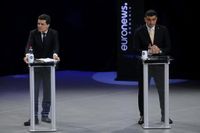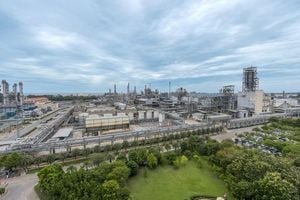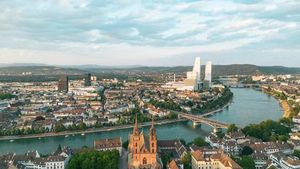In a significant political shift, George Simion, the nationalist frontrunner of the far-right Alliance for the Union of Romanians (AUR), won the first round of Romania’s presidential election held on May 4, 2025. His victory, with 40.94% of the vote, has sent shockwaves through the political establishment, raising questions about Romania's future direction and its relationship with Western allies.
Simion, 39, who has rapidly risen to prominence since founding the AUR in 2019, declared his win a "victory for you, the Romanian people, for our dignity." He emphasized that this election represents a triumph for those who have not lost hope in a free and sovereign Romania. His rhetoric resonates with a significant segment of the population that feels marginalized by the mainstream political discourse.
In a Euronews debate on May 8, Simion articulated his controversial stance regarding Romania's role in the ongoing Russo-Ukrainian war, asserting that Ukraine owes Romania "compensation" for its support during the conflict. He stated, "If elected, Romania will no longer give a single leu to another country," highlighting a shift in focus towards prioritizing the needs of Romanian citizens.
Simion's demands for compensation stem from his belief that Romania has suffered significantly due to the war and should be reciprocated for its assistance. He suggested that Ukraine could repay Romania through mechanisms such as grain or reconstruction contracts, framing the situation as one where Romania should benefit from its contributions. "We must benefit from the Patriot system donated by Klaus Iohannis and other expenses Romanian citizens covered from their own pockets," he insisted, portraying the current government's foreign aid as a betrayal of national interests.
His position on the war is one of strict neutrality, rejecting any military aid to Ukraine and aligning his views with other European leaders who have adopted a similar stance. "Our position on Russia’s war of aggression against Ukraine... is neutrality—not escalation, not arming, and not full alignment with the Trump administration’s policy," Simion stated. This approach has drawn criticism from his opponent, Nicușor Dan, the liberal mayor of Bucharest, who argues that Romania's security is closely tied to Ukraine's stability and has pledged continued support for Ukraine.
Dan, who garnered 20.99% of the vote in the first round, has warned that a presidency under Simion would jeopardize Romania's standing within the European Union and its support for Ukraine. He emphasized the need for Romania to vote in favor of new support packages for Ukraine, stating, "My country is Romania. I will only vote in line with the interest of the Romanian nation and without prioritizing other states." Dan’s commitment to aiding Ukraine contrasts sharply with Simion's more isolationist approach.
The debate also touched on broader themes of governance and national unity. Simion proposed a national unity cabinet that would include representatives from across the political spectrum, aiming to foster a climate of peace and stability. He criticized the current political climate as one of fear, exacerbated during the Covid-19 pandemic, and suggested that his government would seek to calm tensions within society.
However, Dan rejected this vision, advocating instead for a government composed solely of pro-Western parties and national minority representatives. He named Ilie Bolojan, a former mayor known for administrative reforms, as his preferred candidate for prime minister, emphasizing the need for a leader focused on development and institutional integrity.
As the second round of the presidential election approaches on May 18, 2025, the stark contrasts between the candidates' visions for Romania's future are becoming increasingly clear. Simion's far-right platform and anti-establishment rhetoric attract a growing base of support, particularly among those disillusioned with traditional political parties. Meanwhile, Dan's pro-European stance seeks to reassure voters of Romania's commitment to its allies and the broader European project.
Polling indicates a divided electorate, with many voters still undecided about which candidate best represents their interests. The outcome of this election could have far-reaching implications not only for Romania's domestic policies but also for its foreign relations, particularly with neighboring Ukraine and other European nations.
In light of these developments, analysts warn that the rise of nationalist sentiments in Romania could signal a shift away from pro-Western policies that have characterized the country’s political landscape in recent years. As both candidates prepare for the final debate and the subsequent election, the stakes have never been higher for the future of Romania.





